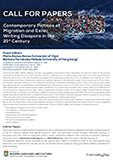
| News & Events |
| 28 October 2020 | |
Call for papers Guest editors: Deadline for abstract submissions: March 31, 2021 |
|
James Procter (2007) defines 'diaspora' as both a geographical phenomenon and a theoretical concept that stands for the physical movement of people from one area to another, and for a particular way of understanding world order and cultural representations. Literature mirrors some of the most immediate challenges that contemporary society has to face as migration has turned 'glocal'. Many characteristics that shape contemporary migratory movements depend on the destination sought, the circumstances that force them, and the links maintained with the country of origin. This special issue is interested in exploring the ways in which contemporary fiction writes legal, illegal migration and the different shades between both. The European Union, as a comfort zone (Cafruny and Ryner 2003; Schmidt 2006; Geddes 2008) and the border between Mexico and the U.S., as a conflict zone (Anzaldúa 1987; Tokatlian 2000; Staudt 2008) are two of most productive 'diaspora spaces' (Brah 1996) for analysing the subaltern position of the migrant subject through literature, although not the only ones. Transoceanic movements of Afghan, Somali and/or Syrian refugees that seek shelter, the case of Hongkongers whose flexible citizenship has allowed them to ameliorate political risks, or the Windrush Generation being sent back to Jamaica by the UK Home Office are some of the myriads of diasporic experiences of interest for contemporary authors. We are looking for innovative approaches to texts that offer new literary techniques, styles, aesthetics, voices and/or themes that shed light on the critical issues that contemporary migrations represent for society in a general sense at the dawn of the 21st century. Suggested topics include both theoretical and practical approaches to fiction written in English, and avenues of research related to: ・ Transmigration through comfort and/or conflict zones Call for Papers The selected abstracts will be compiled as the special issue's table of contents in order to be submitted for final approval to an international, top-tier journal. Full articles will be revised by the guest editors before submission for peer reviewing. Works Cited
|
|
